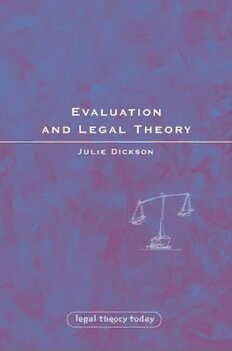
Evaluation and Legal Theory (Legal Theory Today) PDF
161 Pages·2001·6.697 MB·English
Most books are stored in the elastic cloud where traffic is expensive. For this reason, we have a limit on daily download.
Preview Evaluation and Legal Theory (Legal Theory Today)
Description:
If Raz and Dworkin disagree over how law should be characterized, how are we, their jurisprudential public, supposed to go about adjudicating between the rival theories which they offer us? To what considerations would those theorists themselves appeal in order to convince us that their accounts of law are accurate and successful? Moreover, what is it that makes an account of law successful? This book tackles methodological or meta-theoretical issues such as these, and does so by answering the question: to what extent, and in what sense, must a legal theorist make value judgements about his data in order to construct a successful theory of law? Dispelling the perplexing myth that legal positivism seeks a value-free account of law, the author explains and defends Joseph Raz's position that evaluation is essential to successful legal theory, while refuting John Finnis and Ronald Dworkin's contentions that the legal theorist must morally evaluate and morally justify the law in order to properly explain its nature. The book does not claim to solve the many mysteries of meta-legal theory but does seek to contribute to and engender rigorous and focused debate on this topic.
See more
The list of books you might like
Most books are stored in the elastic cloud where traffic is expensive. For this reason, we have a limit on daily download.
